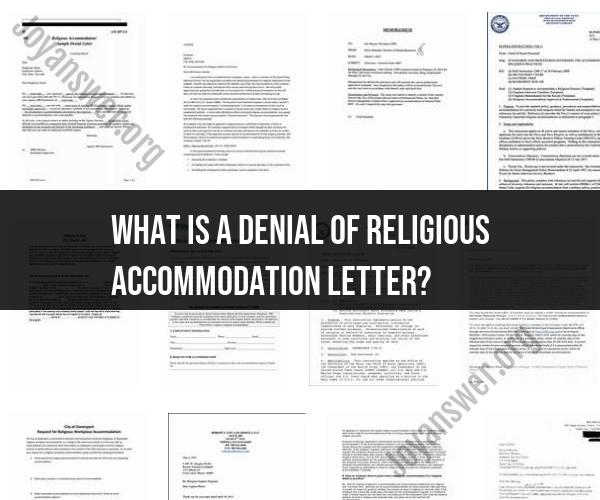What is a denial of religious accommodation letter?
Religious accommodation is a process that allows individuals to practice their sincerely held religious beliefs while meeting the requirements of an organization or institution. When a request for religious accommodation is denied, a denial of religious accommodation letter is typically issued to explain the decision. In this article, we will explore the key aspects of understanding denial of religious accommodation letters.
Reasons for Denial:
Undue Hardship: One of the primary reasons for denying a religious accommodation request is the presence of an undue hardship. An undue hardship occurs when accommodating the request would cause significant difficulty or expense for the organization. This might include financial burdens, disruption of operations, or compromising safety.
Fundamental Alteration: Accommodating a religious request should not require a fundamental alteration of the organization's core functions or policies. If granting the accommodation would fundamentally change the nature of the job or services provided, it may be denied.
Direct Threat: If accommodating the religious request poses a direct threat to the safety of others, it can lead to denial. Organizations must prioritize the safety and well-being of all individuals.
Lack of Sincerity: Another reason for denial can be a lack of sincerity in the religious belief or practice. Organizations may request additional information or documentation to assess the sincerity of the request.
Legal Framework:
In many countries, laws protect individuals' right to religious accommodation, such as the U.S. Civil Rights Act or the Canadian Human Rights Act. Denial of accommodation should be consistent with the legal framework and the principles of non-discrimination.
Organizations must be aware of their legal obligations and ensure that denial of accommodation is based on legitimate reasons as defined by relevant laws.
Notification Process:
When a request for religious accommodation is denied, the individual should receive a formal denial of religious accommodation letter. This letter should clearly state the reasons for denial, reference any applicable laws or policies, and outline any alternative solutions that were considered.
The letter should also provide information on the process for appealing the decision and seeking further clarification if necessary.
Appeal Process:
Individuals who receive a denial of religious accommodation letter typically have the right to appeal the decision. The appeal process allows the individual to present additional information or arguments in support of their request.
Organizations should have a clearly defined and transparent appeal process to ensure fairness and compliance with the law.
Balancing Rights:
- Denying a religious accommodation request can be a delicate balancing act between the rights of the individual and the legitimate interests of the organization. Organizations must demonstrate that they have carefully considered the request and explored alternatives before making a denial decision.
Understanding denial of religious accommodation letters involves recognizing the legal framework, reasons for denial, and the importance of a fair and transparent process. While organizations have the right to deny accommodation requests under certain circumstances, they must do so in a way that respects individuals' religious rights and complies with relevant laws. It is essential for both individuals and organizations to be aware of their rights and responsibilities in the accommodation process.













